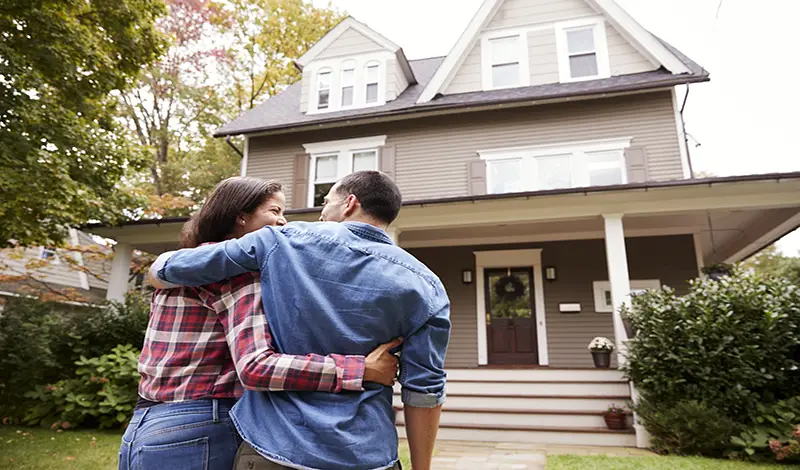Should I Buy a "Right Now" Home or a "Forever" Home?
Published on August 19, 2024 | 6 Minute read

Melanie
Ortiz Reyes
Content Specialist
Buying a home is not just about finding a place to live but about choosing a space where you'll create memories, build a life, and invest in your future. One of the key questions you'll face when searching for a house is whether to buy a "right now" home or a "forever" home. Both options have their advantages and drawbacks, and the right choice depends on your personal circumstances, goals, and lifestyle.

What Is a “Right Now” Home?
A "right now" home is a property that meets your immediate needs. It might not be your dream home, but it suits your current situation. These homes are often chosen by first-time buyers, those looking to upgrade from renting, or people who anticipate significant life changes in the near future.
Pros of a “Right Now” Home
1. Budget-friendly: Generally more affordable, allowing you to build equity and save for future investments.
2. Adaptable: Perfect for those with uncertain plans, offering freedom to adjust as life evolves.
3. Lower maintenance: Often newer or recently updated, reducing initial upkeep costs.
4. Learning experience: Provides an opportunity to understand your preferences for a future "forever" home.
Cons of a “Right Now” Home
1. Limited personalization: Less scope for customization to match your unique style.
2. Potential for relocation: As your needs change, you might outgrow the space sooner than expected.
3. Market fluctuations: Selling might be affected by market conditions, impacting your return on investment.

What Is a “Forever” Home?
A "forever" home is a property you plan to live in for the long haul. It's a place where you can envision yourself settling down, raising a family, and enjoying your golden years. This home is often customized to suit your tastes, needs, and future plans, making it a long-term investment in both your lifestyle and finances.
Pros of a “Forever” Home
1. Long-Term Stability: A "forever" home offers stability, both emotionally and financially. Knowing that you have a place to call your own for the foreseeable future can provide a sense of security and peace of mind.
2. Personalization: Since you plan to stay in this home for many years, you're more likely to invest in customizations, renovations, and upgrades that reflect your personal style and needs. This can make the space truly feel like your own.
3. Potential for Appreciation: Over time, the value of a "forever" home is likely to increase, especially if you've chosen a desirable location. This appreciation can be a significant financial benefit if you ever decide to downsize or sell.
4. Community Connections: Staying in one place long-term allows you to build deeper connections with your neighbors and community. You can establish roots, participate in local events, and become a part of the neighborhood's fabric.
Cons of a “Forever” Home
1. Higher Costs: "Forever" homes often come with a higher price tag, not just in terms of the purchase price but also in ongoing maintenance, taxes, and utilities. This can stretch your budget and limit your financial flexibility.
2. Less Flexibility: If your circumstances change, such as a job relocation, family growth, or lifestyle shift, it can be more challenging to move from a "forever" home. Selling a home that's deeply personalized and emotionally significant can be difficult.
3. Pressure to Choose Perfectly: The idea of a "forever" home can create pressure to find the perfect property. This can lead to decision paralysis or settling for a home that doesn’t meet all your needs, simply because you're trying to avoid future moves.

Making the Right Choice
1. Current and Future Financial Situation: Evaluate your current financial standing and future earning potential. Can you comfortably afford a "forever" home now, or would it be wiser to build equity in a "right now" home and upgrade later?
2. Life Stage: Consider where you are in life. If you're early in your career, recently married, or planning to start a family, a "right now" home might be more appropriate. On the other hand, if you're settled in your career and personal life, a "forever" home could be a better fit.
3. Market Conditions: Research the current housing market. If prices are rising and interest rates are low, it might be a good time to invest in a "forever" home. Conversely, if the market is volatile, a "right now" home could offer a safer, short-term investment.
4. Long-Term Goals: Reflect on your long-term goals. Where do you see yourself in 10, 20, or 30 years? If you have a clear vision of your future, a "forever" home might align with those plans. If not, a "right now" home offers the flexibility to change course as your goals evolve.
Deciding whether to buy a "right now" home or a "forever" home is a deeply personal choice, influenced by your financial situation, life stage, and long-term goals. Both options have their merits, and there’s no one-size-fits-all answer.
As you weigh your options, take the time to evaluate what matters most to you and your family. Consider your current needs and future aspirations, and don't be afraid to seek advice from real estate professionals who can guide you through the decision-making process. Ultimately, whether you choose a "right now" home or a "forever" home, the goal is to find a place where you can thrive, create lasting memories, and feel truly at home.